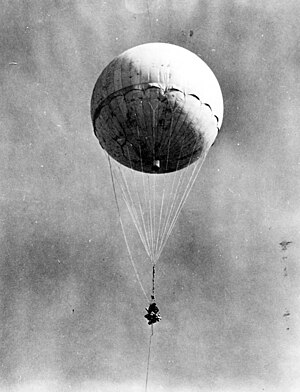Fire balloon
| Fire balloon 風船爆弾 (fūsen bakudan) |
|
|---|---|
 |
|
| Shot-down fire balloon reinflated by Americans in California. | |
| Role | Hydrogen balloon |
| National origin | Japan |
| Manufacturer | Imperial Japanese Navy |
| Built by | Imperial Japanese Navy |
| First flight | 1944 |
| Introduction | November 3, 1944 |
| Retired | April 1945 |
| Primary users | Imperial Japanese Navy Imperial Japanese Army |
| Produced | 1944-1945 |
| Number built | over 9,300 |
| Developed into | E77 balloon bomb |
A fire balloon (風船爆弾 fūsen bakudan?, lit. "balloon bomb"), or Fu-Go (ふ号[兵器] fugō [heiki]?, lit. "Code Fu [Weapon]"), was a weapon launched by Japan during World War II. A hydrogen balloon with a load varying from a 15 kg (33 lb) antipersonnel bomb to one 12-kilogram (26 lb) incendiary bomb and four 5 kg (11 lb) incendiary devices attached, it was designed as a cheap weapon intended to make use of the jet stream over the Pacific Ocean and drop bombs on American and Canadian cities, forests, and farmland.
The Japanese fire balloon was the first ever weapon possessing intercontinental range (the second being the Convair B-36 Peacemaker and the third being the R-7 ICBM). The Japanese balloon strikes on North America were at that time the longest ranged attacks ever conducted in the history of warfare, a record which was not broken until the 1982 Operation Black Buck raids during the Falkland Islands War.
The balloons were ineffective as weapons but were used in one of the few attacks on North America during World War II.
...
Wikipedia
